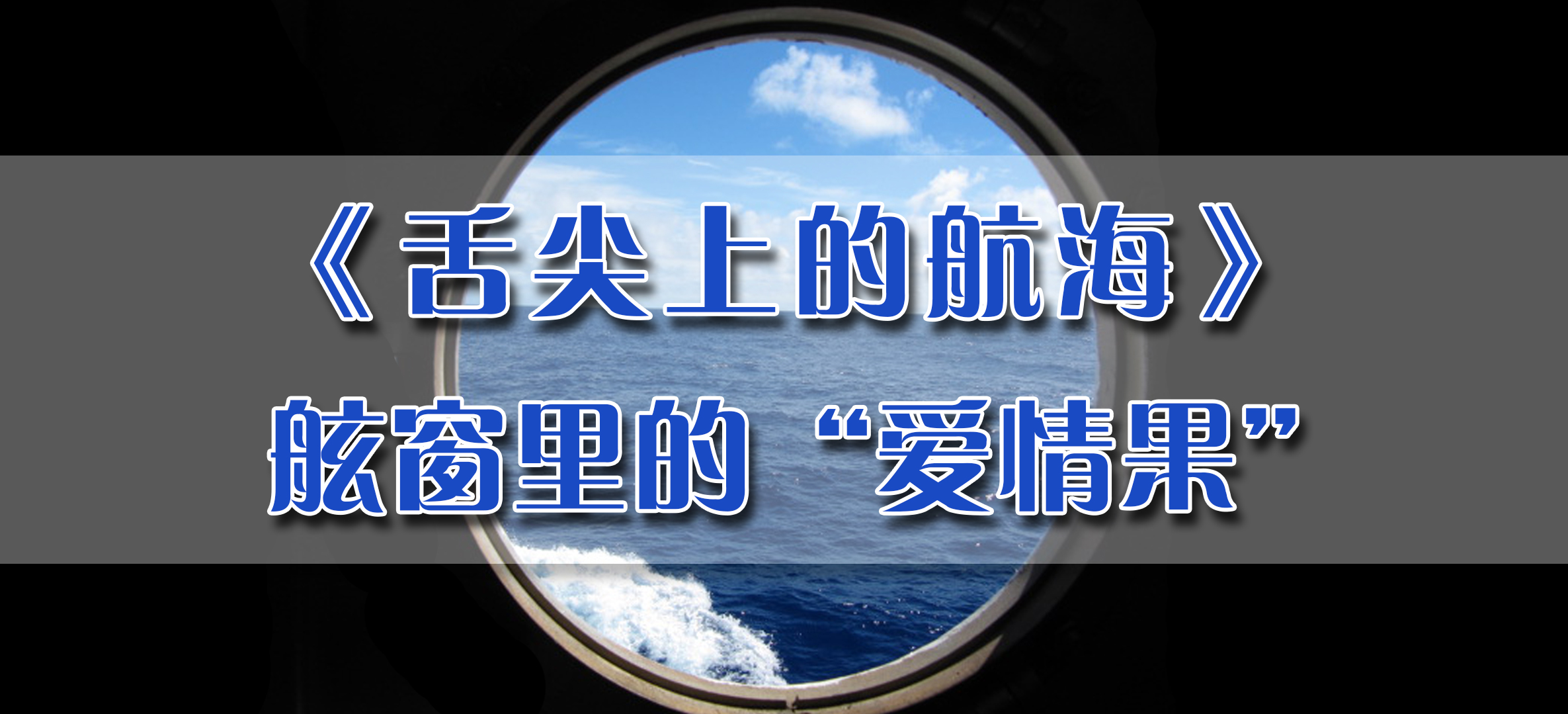远洋航船常年飘泊在大洋里,海员们习惯在舷窗旁摆上花果盆景。望着这些来自陆地的生物,心里有股说不出的亲切感。
海员们称它们是海员的”海上伴侣”。

肖惠惠来自海员大省福建,是位资深的海乘(邮轮服务员)。当地人有个习惯,每当离家远航,总会把家乡一种叫“望乡花”的植物带上船,摆在舷窗旁。
据说“望乡花”有个至今使人弄不明白的特征:无论轮船航行在那里,花朵总是朝着家乡的方向。所以,人们亲切地称它为”望乡花”。
一年,肖惠惠随船来到日本大贩。正值世界女排大奖赛。中国女排力克群雄夺得冠军。在颁奖台前,一位年迈的老华侨带着小孫女,将一束“望乡花”献给女排姑娘。当人们知晓“望乡花”是这位老华侨几十年前离家时带过来的,近年因年老体弱,由身边这位双目失明的小孫女护养时,肖惠惠感动地热泪盈眶。
不久前,肖惠惠被外派到一艘叫《伊丽莎白女王》号的邮轮上做服务员。
肖惠惠临行前,精心选了一盆家乡的“望乡花“。
《伊丽莎白女王》号是艘豪华的环球邮轮,是以英国女王伊丽莎白命名的,除了没备齐全舒适外,几乎每个舷窗里都摆有各式各样来自世界各地的花果盆景:美洲的紫罗兰,荷兰的郁金香,非洲的笆蕉红…,可谓“舷窗花“的世界。有“海上花坊”的美称而享誉航海界。
肖慧慧把“望乡花”放置在住舱最显眼的舷窗旁:“让中国的花果为《海上花坊》增光添色吧!“
一天,她在打扫船长房间时,忽然发现船长房间的舷窗上摆放的盆景与众不同,是一盆结满了红果的,形似“西红柿”的“舷窗花”,引起了肖慧慧的好奇和猜疑:“船长与這盆花果一定有故事!”
果然不出肖慧慧所料。船长威尔逊是位典型的英国人,有着贵族血统。舷窗里的“西红柿”不仅与航海有关,还与英国女王伊丽莎白一世的爱情有关。船长威尔逊与其有不解之缘。
肖慧慧想知道其中的奥妙。
但是,令肖慧慧失望的是,船长是位沉默寡言的人,连与他同船多年的船员都不知其中的故事,只知船长称这盆”西红柿”叫“爰情果”。
肖慧慧没有灰心,利用打扫船长舱室的条件和机会,渐渐摸清了船长的脾气和爱好,得到了威尔逊船长的信任和好感。终于在肖慧慧离船公休前,揭开了《伊丽莎白号》人们至今尚不知曉的”谜”。
“西红柿”的发现与传播与航海有密不可分的关係。早在十六世纪初期,伟大的航海家哥伧布远航南美洲时,就发现了这种”神奇”的植物;颜色艳亮,气味鲜美。直到十六世纪未,葡萄牙航海探险队,终于将在南美洲发现的这种野生花果带回欧洲。
起初,野生的西红柿个头很小,虽然外形艳丽娇捎,但是味道却十分奇特。欧洲人认为它有毒,只是狐狸和狼才会吃它。所以取名“狐狸的果实”或“狼桃”。至今仍有欧洲人称它为“狐狸的果实”或“狼桃”。
一次偶然的机会,英国的俄罗达里公爵发现这种十分可爱的野生植物,把它移栽花园里,视为珍宝。在伊丽莎白一世女王生日那天,摘下艳丽的果实献给女王,以示炽热的爰情。
英国历史上有二位伊丽莎白女王:一位是现代的伊丽莎白女王,一位是伊丽莎白一世女王。出生在十五世纪的伊丽莎白一世女王性情弧骄,是英国亨利八世与安妮,博林的孩子。虽然被指定为王位继承人。后来,由于王室的争纷和宗教的干扰,继承王位的路十分曲折艰辛。直到亨利八世去世后才登上女王的宝座。
伊丽莎白一世女王在位45年,是英国的黄金时代。但是,伊丽莎白一世一生保持独身没有结婚。来自国外的:西班牙,德国,罗馬,瑞典等国的皇亲国戚排成了长长的求婚队伍…。国内的达官显贵更是屡不胜数。其中,英国贵族俄罗达里公爵最有代表性的一员。
伊丽莎白一世女王谢绝了所有求婚者的礼品,唯独收下了俄罗达里公爵这束鲜丽的“西红柿”,引起英国上下的极大轰动!虽然,伊丽莎白一世最终没有接受俄罗达里公爵的求婚。但是“西红柿”成了炽热爱情的象征。从此“西红柿”有了“爱情果”的美誉。
船长威尔逊是俄罗达里公爵的后裔,祖辈这樁象征爱情的故事和荣耀,使他终身难忘:航海使欧洲人得到了“爱情果”,“爱情果”又使人们忆起了伊丽莎白一世女王时代的繁荣盛世。
所以,威尔逊放弃许多陆上的工作机会,走上海洋,做了一名航海者,並把“爰情果”随身带在身边…。
肖慧慧被这个故事感动了。回国后,《舷窗里的“爰情果"》的故事很快在网上走红,点击率节节攀升。
肖慧慧还专门查询了“爱情果”,被中国称为“洋柿子”传入中国的历史:“西红柿”最初传入中国是明未,通过”海上絲路”引进的。明代的王象晋所著《群芳谱》里记载的西红柿:“最堪现,火伞火珠,未足为喻”是最早做为国内观尝植物的记载。
西红柿真正成为中国人歺桌上的美食,是在鸦片战争前后。直到上世纪初,”西红柿”才在中国大力发展起来,成为大众喜爰的美食。
当人们食用这种美食时,不要忘了那些航海者,是他们给我们带来了《舷窗里的“爱情果》的故事和它的美味。
张涛系中国航海学会科普专家、中国远洋海运作家协会副主席、中国知名海员作家、“一带一路”应用型海事 人才研究院特聘研究员。作为远洋船长,其在工作之余,笔耕不辍,为宣传航海文化做出了较大贡献,被誉 为“当代弘扬航海文化有突出贡献的航海人”。先后在人《民日报》《中国建设》《海事大观》《航海》《中国海 员》等报纸杂志上发表了大量文章,并出版了《我们都是无产者》《船长与黄金》《路娃航海记》《船长风云 录》《海上天方夜谭》《舌尖上的航海》等十余部近百万余字反映航海经历的文艺作品。其中《我们都是无产 者》和《海上天方夜谭》获国家优秀作品奖;《路娃航海记》获中国航海学会特别贡献奖;《舌尖上的航海》曾 在国内多家网站和报纸杂志上发表及刊登,受到广大读者,特别是航海爱好者的热烈欢迎和好评;同时被译 成英文,受到外国青少年和航海爱好者的喜爱。 2021年3月,江苏航运职业技术学院设立了“张涛海员作家”工作室。希望此工作室能够创作出更多更好的作 品来弘扬和发展海洋文化!
On long and arduous voyages, many sailors often put flowers and fruits on the ledge of
their portholes. As they stared at the beautiful creatures they brought alongside from their
homes on land, an indescribable sense of longing often blossomed inside their hearts.
Some seafarers referred to these flowers and fruits as their companions.
Xiao, a sailor from Fujian, China, was a senior cruise attendant on board an international
cruise ship. Sailors from Fujian had a tradition of bringing a kind of plant named the “Wang
Xiang Flower” and placing it as a decoration by the porthole whenever they sailed away from
home.
The name “Wang Xiang Flower” can be translated to the flower of those who miss their
homes. But the most peculiar thing about these flowers is that no matter where the ship sails,
the flower always blooms in the direction of home.
One year, Xiao traveled to Osaka, Japan with her ship on the same weekend that the
Women’s Volleyball World Championships were taking place. The Chinese National Team
triumphantly defeated all other contestants and took home the first prize in the
championships. As the team stood on the podium, an elderly Chinese woman and her young
granddaughter walked up to the stage, and presented a bouquet of Wang Xiang Flowers to the
girls in the volleyball team. Xiao was surprised to see the flowers that she held so dear
featured in an international celebration, but when she found out that the elderly lady had
brought the flowers over from home decades ago and only decided to give them away now
because she had become frail from old age and still had to take care of her blind
granddaughter, Xiao was moved to tears.
Not long after, Xiao was assigned to be a cruise attendant on a famous cruise liner
named the Queen Elizabeth.
Before she left home for his new position, she prepared a pot of Wang Xiang Flowers
that she picked specifically from his relatives’ garden.
The Queen Elizabeth liner was a luxurious globetrotting cruise ship named after Queen
Elizabeth of England herself. In addition to being equipped with the most comfortable,
advanced furniture and technology, every single porthole had a pot of flowers from a different
corner of the world sitting on its ledge: violets from the Americas, tulips from the
Netherlands, scarlet banana flowers from Africa… It was paradise for the porthole flora, a
bountiful floating garden on the sea.
Xiao set down her pot of Wang Xiang flowers on the ledge of a porthole near all the
other colorful flowers on the ship. Together, the flowers that hailed from different countries
all lived in harmony, spreading joy and their soothing unique scents to every single guest that
came onboard.
One day, when Xiao was cleaning the captain’s bedroom, she suddenly noticed that the
flowers that were set next to the captain’s porthole were unlike any other plant she had ever
seen before. The flowers were bright red in color, and bloomed with small, round fruits that
looked like cherry tomatoes. Xiao was immediately taken by these lovable blossoms, and
knew she had to ask the captain about what exactly they were.
Captain Wilson of the cruise ship Queen Elizabeth came from the United Kingdom, and
some say that his family even descended from the royal bloodline. These “cherry tomatoes”
that sat by Captain Wilson’s porthole not only played a fascinating part in maritime history,
they were also the symbol of the most romantic story of Queen Elizabeth’s life.
Xiao wanted to know what the tale beyond these adorable flowers were.
However, to Xiao’s disappointment, Captain Wilson was a quiet, reserved individual
who never really shared much about his life. Even old crew members who had been working
with Captain Wilson for many years weren’t able to uncover the mystery beneath these
flowers, but they did know that Captain Wilson called these fruits “The Fruits of Love”.
Xiao wasn’t ready to give up on those fruits just yet. Over the years she worked on the
Queen Elizabeth, she spent a large amount of time speaking and getting to know the captain,
eventually becoming good friends with him. Before she went home on vacation one year, she
finally unveiled the secrets of Captain Wilson’s fruits of love.
To her surprise, the discovery and trade of these cherry tomatoes were indisputably
related to seafaring. In the early 16th century, the Italian navigator Columbus discovered
these unusual fruits in South America. They were bright and eye-catching, and also tasted
sweet and succulent. But it wasn’t until the end of the 16th century, when a Portuguese
discovery fleet found these fruits in South America and finally brought them back to Europe.
In the beginning, wild tomato plants yielded very small fruits, which despite being
delicate in appearance, had an unexpectedly odd taste. Europeans initially thought that these
fruits were poisonous and that only foxes and wolves would ever feed on them. Botanists
assumed that tomatoes were in fact a fruit named nightshade, which were related to the
poisonous belladonna.
By chance, Sir Walter Raleigh of England took a liking to these tomatoes and planted
them in his garden, viewing them as a precious delicacy. On Queen Elizabeth’s birthday, he
collected a big, juicy tomato and offered it to Queen Elizabeth as a gesture of his love.
Queen Elizabeth I, unlike the current English monarch Queen Elizabeth II, grew up
isolated in royal life and was quite a lonely woman. She was the daughter of King Henry VIII
and Queen Anne Boleyn, and was the heir to the royal throne. Her path to the crown was
demanding and challenging due to royal discord and interference from the church, and she
did not ascend to the throne until the passing of her father, Henry VIII.
But Queen Elizabeth’s reign lasted for forty-five years, bringing about what many saw
as the Golden Age in England. During Queen Elizabeth’s reign, she proved her dedication to
her responsibilities as monarch and never married or took a lover. Candidates from Spain,
Germany, Rome, Sweden, and various other nations asked for her hand in marriage, and
noblemen from within England did the same. Sir Walter Raleigh was one such candidate.
When presented with countless luxurious and extravagant offerings, Queen Elizabeth
rejected all of them except for one item: Sir Walter Raleigh’s beaming red, delicious tomato.
Her acceptance of the gift sent a shock through the entire United Kingdom, elevating the
tomato from a common fruit to a symbol of royal romance. And yet, Queen Elizabeth never
accepted Sir Walter Raleigh’s marriage proposal, only ever leaving hints of romance in a
plant that became known as the “Fruit of Love”.
Xiao found out that Captain Wilson was a distant relative of Sir Walter Raleigh. The
story and glories of his ancestors and their symbol of love influenced Captain Wilson’s
decision to become a seafarer: the tomato was brought to Europe by sailors and navigators,
which in turn allowed generations of people to remember the prosperity of Queen Elizabeth’s
time as monarch.
Therefore, Captain Wilson rejected numerous lavish positions and jobs that he could
have enjoyed on land, and instead studied at nautical school in order to become a man of the
sea. Wherever he went, he brought tomatoes with him as a symbol of love and the influences
of maritime history.
Xiao was deeply touched by Captain Wilson’s story. After she returned home, she wrote
about her experiences onboard the Queen Elizabeth and published them online, allowing
masses of readers to enjoy these wonderful tales.
She also researched the origins of tomatoes in China, and found out why their name
translated to “red western fruit” in Chinese.
Tomatoes were first brought to China at the end of the Ming Dynasty through the
Maritime Silk Road. They were first mentioned in the Chinese poem “Qun Fang Pu” and
described as “a delicate, fiery pearl that went beyond the boundaries of common fruits”.
Tomatoes became a delicacy in China after the Opium Wars, and finally achieved
household status in the19th century, as Chinese people fell in love with the delicious
ingredient.
Xiao hoped that when people tasted the magical fruit of love, they wouldn’t forget the
voyages of the sailors that brought tomatoes to the masses’ table, and the wondrous tales that
came with them.
Zhang Tao is an expert in the fields of navigation, maritime history, and nautical science. He is involved in the Chinese Institute of Navigation, and is the vice president of the Chinese Association of Maritime Authors, a well-known Chinese author of subjects related to seafaring, as well as a distinguished researcher for the nautical analysis of the “One Belt One Road” Initiative. Aside from leading sailing crews as an esteemed captain of many Chinese ships, he works tirelessly in his spare time and has made important contributions to nautical culture and history. He has been described as “a navigator with momentous involvement in the promotion of seafaring culture in modern times”. He has published articles in People’s Daily, China’s Construction, Maritime Spectacle, Sailing, and Chinese Sailors and more magazines and newspapers. His authorial works include We Are All Proletarians, The Captain and Gold, Lu Wa’s Sailing Journal, The Captain of Wind and Clouds, Fairy Tales from the Sea, and The Taste of Seafaring, all of which reflect and promote the experience and culture of seafaring to millions of readers. Among his works, We Are All Proletarians and Fairy Tales from the Sea have won the National Outstanding Novel Award; Luwa’s Sailing Journal won the Outstanding Contribution Award from the Chinese Institute of Navigation; and The Taste of Seafaring has been published on multiple Chinese websites and magazines, attracting new waves of readers and audiences and acclaim from those with particular interest in sailing. The Taste of Seafaring has now been translated into English and is beloved by youths and nautical enthusiasts worldwide. In March of 2021, the Jiangsu Shipping College established the Zhang Tao Sailing Author’s Workshop. Hopefully, more wonderful stories and writings will come to fruition with the help of the workshop, and inspire people from all across the globe to learn about maritime culture!



 扫码下载APP
扫码下载APP

 科普中国APP
科普中国APP
 科普中国
科普中国
 科普中国
科普中国
